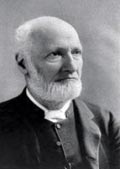the First Week of Lent
Click here to learn more!
Bible Commentaries
Comentario popular de Schaff sobre el Nuevo Testamento Comentario del NT de Schaff
Nuevo Testamento
Jesus' life, teachings, and fulfillment of Old Testament prophecies as the Messiah. San Marcos
A fast-paced account of Jesus' ministry, focusing on his actions and sacrificial death. San Lucas
Jesus' life, emphasizing compassion for the marginalized and the universal scope of salvation. San Juan
Theological reflections on Jesus as the Word of God, focusing on his divine nature and mission. Hechos
The early church's growth, the apostles' ministry, and the spread of the Gospel. Romanos
A theological treatise on salvation, grace, faith, and righteousness through Jesus Christ for all. 1 Corintios
Paul addresses divisions, immorality, and spiritual gifts in the Corinthian church. 2 Corintios
Paul's defense of his apostleship, his sufferings, and the power of God's grace. Gálatas
Paul's defense of the Gospel of grace against legalism, emphasizing faith in Christ alone. Efesios
Paul's teachings on the church's unity, spiritual blessings in Christ, and Christian conduct. Filipenses
A letter of joy and encouragement, urging humility and faithfulness amid persecution. Colosenses
Paul's emphasis on Christ's supremacy and warnings against false teachings. 1 Tesalonicenses
Encouragement to a young church, with teachings on holiness and Christ's return. 2 Tesalonicenses
Clarifications about Christ's return and exhortations to stand firm in faith. 1 Timoteo
Guidance for church leadership, sound teaching, moral conduct, and defending the truth of the gospel. 2 Timoteo
Paul's final exhortations to Timothy, emphasizing perseverance and faithfulness. Tito
Instructions for establishing order in the church, promoting sound doctrine, and living with integrity. Filemón
A personal appeal for the forgiveness and restoration of a runaway slave, Onesimus. Hebreos
An insightful look at Christ's supremacy, priesthood, and the fulfillment of prophecies. Santiago
Practical wisdom on living out one's faith through good works and righteous behavior. 1 Pedro
Encouragement for suffering Christians to remain faithful and hopeful in their trials. 2 Pedro
A reminder to grow in faith, resist false teachings, and remain steadfast awaiting His return. 1 Juan
Teachings on love, obedience, and assurance of salvation through fellowship with God. 2 Juan
A letter encouraging love, obedience to God's commands, caution against teachings that deny Christ's truth. 3 Juan
A personal letter commending hospitality and warning against arrogance in church leadership. Judas
A strong warning against false teachers and a passionate call to defend the faith and uphold the truth. Apocalipsis
Apocalyptic visions of God's ultimate victory, Christ's return, and the new heaven and earth.
Author's Biography
Philip Schaff (1819â1893) fue un teólogo e historiador eclesiástico nacido en Suiza y educado en Alemania, cuyo trabajo e influencia cruzaron océanos y denominaciones. Emigrando a los Estados Unidos en 1844, Schaff realizó profundas contribuciones a la vida religiosa estadounidense, impactando significativamente la educación teológica, el ecumenismo y los estudios de historia de la iglesia. Su trayectoria académica comenzó con su educación en la Universidad de BerlÃn, donde fue influenciado por figuras como August Neander y Friedrich Schleiermacher, destacadas personalidades de la escena teológica alemana del siglo XIX.
La carrera de Schaff en los Estados Unidos se caracterizó por un compromiso duradero con la unidad de las denominaciones cristianas. Abogó por un cristianismo "católico" (universal) que trascendiera las lÃneas denominacionales, una visión que estaba adelantada a su tiempo y profundamente arraigada en la tradición cristiana primitiva. Este espÃritu ecuménico informó gran parte de su trabajo, incluido su papel en el Comité de Revisión de la Biblia Americana, que produjo la Versión Estándar Americana de la Biblia.
Tal vez el legado más perdurable de Schaff sea su trabajo editorial en la "Enciclopedia de Conocimiento Religioso Schaff-Herzog", una obra de referencia exhaustiva que sigue siendo un recurso valioso para teólogos e historiadores. Sin embargo, su obra magna es la "Historia de la Iglesia Cristiana" en varios volúmenes, una obra completa que narra el desarrollo del cristianismo desde la era apostólica hasta la Reforma. Este trabajo monumental muestra la erudición meticulosa de Schaff, su pasión por la unidad de la iglesia y su profundo respeto por la historia y la doctrina cristianas.
Las contribuciones de Philip Schaff a la teologÃa y la historia de la iglesia reflejan su profunda fe, rigor intelectual y una creencia visionaria en la unidad del pueblo de Dios. Sus obras continúan inspirando e informando a académicos, pastores y laicos, sirviendo como puente entre diferentes tradiciones cristianas y épocas históricas. La vida y obra de Schaff encarnan una notable combinación de excelencia académica y compromiso ecuménico, marcándolo como una de las figuras más influyentes del cristianismo estadounidense del siglo XIX.
